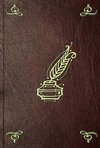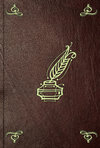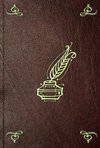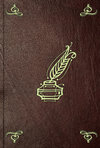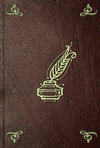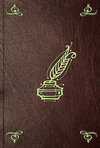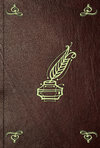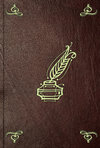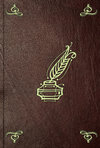Читать книгу: «The History of Sir Charles Grandison, Volume 4 (of 7)», страница 21
LETTER XLI
LADY G–, TO MISS BYRON SUNDAY, MAY 7
I believe I shall become as arrant a scribbler as somebody else. I begin to like writing. A great compliment to you, I assure you. I see one may bring one's mind to any thing.—I thought I must have had recourse, when you and my brother left us, and when I was married, to the public amusements, to fill up my leisure: and as I have seen every thing worth seeing of those, many times over; (masquerades excepted, and them I despise;) time, you know, in that case, would have passed a little heavily, after having shewn myself, and, by seeing who and who were together, laid in a little store of the right sort of conversation for the tea-table. For you know, Harriet, that among us modern fine people, the company, and not the entertainment, is the principal part of the raree-show. Pretty enough! to make the entertainment, and pay for it too, to the honest fellows, who have nothing to do, but to project schemes to get us together.
I don't know what to do with this man. I little thought that I was to be considered as such a doll, such a toy, as he would make me. I want to drive him out of the house without me, were it but to purvey for me news and scandal. What are your fine gentlemen fit for else? You know, that, with all my faults, I have a domestic and managing turn. A man should encourage that in a wife, and not be perpetually teasing her for her company abroad, unless he did it with a view to keep her at home. Our sex don't love to be prescribed to, even in the things from which they are not naturally averse: and for this very reason, perhaps, because it becomes us to submit to prescription. Human nature, Harriet, is a perverse thing. I believe, if my good man wished me to stay at home, I should torture my brain, as other good wives do, for inventions to go abroad.
It was but yesterday, that in order to give him a hint, I pinned my apron to his coat, without considering who was likely to be a sufferer by it; and he, getting up, in his usual nimble way, gave it a rent, and then looked behind him with so much apprehension—Hands folded, eyes goggling, bag in motion from shoulder to shoulder. I was vexed too much to make the use of the trick which I had designed, and huffed him. He made excuses, and looked pitifully; bringing in his soul, to testify that he knew not how it could be. How it could be! Wretch! When you are always squatting upon one's clothes, in defiance of hoop, or distance.
He went out directly, and brought me in two aprons, either of which was worth twenty of that he so carelessly rent. Who could be angry with him? —I was, indeed, thinking to chide him for this—As if I were not to be trusted to buy my own clothes; but he looked at me with so good-natured an eye, that I relented, and accepted, with a bow of graciousness, his present; only calling him an odd creature—And that he is, you know, my dear.
We live very whimsically, in the main: not above four quarrels, however, and as many more chidings, in a day. What does the man stay at home for then so much, when I am at home?—Married people, by frequent absences, may have a chance for a little happiness. How many debatings, if not direct quarrels, are saved by the good man's and his meek wife's seeing each other but once or twice a week! In what can men and women, who are much together, employ themselves, but in proving and defending, quarrelling and making up? Especially if they both chance to marry for love (which, thank Heaven, is not altogether my case); for then both honest souls, having promised more happiness to each other than they can possibly meet with, have nothing to do but reproach each other, at least tacitly, for their disappointment—A great deal of free-masonry in love, my dear, believe me! The secret, like that, when found out, is hardly worth the knowing.
Well, but what silly rattle is this, Charlotte! methinks you say, and put on one of your wisest looks.
No matter, Harriet! There may be some wisdom in much folly. Every one speaks not out so plainly as I do. But when the novelty of an acquisition or change of condition is over, be the change or the acquisition what it will, the principal pleasure is over, and other novelties are hunted after, to keep the pool of life from stagnating.
This is a serious truth, my dear, and I expect you to praise me for it. You are very sparing of your praise to poor me; and yet I had rather have your good word, than any woman's in the world: or man's either, I was going to say; but I should then have forgot my brother. As for Lord G–, were I to accustom him to obligingness, I should destroy my own consequence: for then it would be no novelty; and he would be hunting after a new folly.—Very true, Harriet.
Well, but we have had a good serious falling-out; and it still subsists. It began on Friday night; present, Lord and Lady L–, and Emily. I was very angry with him for bringing it on before them. The man has no discretion, my dear; none at all. And what about? Why, we have not made our appearance at court, forsooth.
A very confident thing, this same appearance, I think! A compliment made to fine clothes and jewels, at the expense of modesty.
Lord G– pleads decorum—Decorum against modesty, my dear!—But if by decorum is meant fashion, I have in a hundred instances found decorum beat modesty out of the house. And as my brother, who would have been our principal honour on such an occasion, is gone abroad; and as ours is an elderly novelty, as I may say, [Our fineries were not ready, you know, before my brother went,] I was fervent against it.
'I was the only woman of condition, in England, who would be against it.'
I told my lord, that was a reflection on my sex: but Lord and Lady L–, who had been spoken to, I believe, by Lady Gertrude, were both on his side—[I shall have this man utterly ruined for a husband among you]– When there were three to one, it would have looked cowardly to yield, you know. I was brave. But it being proposed for Sunday, and that being at a little distance, it was not doubted but I would comply. So the night passed off, with prayings, hopings, and a little mutteration. [Allow me that word, or find me a better.] The entreaty was renewed in the morning; but, no!—'I was ashamed of him,' he said. I asked him if he really thought so?—'He should think so, if I refused him.' Heaven forbid, my lord, that I, who contend for the liberty of acting, should hinder you from the liberty of thinking! Only one piece of advice, honest friend, said I: don't imagine the worst against yourself: and another, if you have a mind to carry a point with me, don't bring on the cause before any body else: for that would be to doubt either my duty, or your own reasonableness.
As sure as you are alive, Harriet, the man made an exception against being called honest friend; as if, as I told him, either of the words were incompatible with quality. So, once, he was as froppish as a child, on my calling him the man; a higher distinction, I think, than if I had called him a king, or a prince. THE MAN!—Strange creature! To except to a distinction that implies, that he is the man of men!—You see what a captious mortal I have been forced to call my lord. But lord and master do not always go together; though they do too often, for the happiness of many a meek soul of our sex.
Well, this debate seemed suspended, by my telling him, that if I were presented at court, I would not have either the Earl or Lady Gertrude go with us, the very people who were most desirous to be there—But I might not think of that, at the time, you know—I would not be thought very perverse; only a little whimsical, or so. And I wanted not an excellent reason for excluding them—'Are their consents to our past affair doubted, my lord, said I, that you think it necessary for them to appear to justify us?'
He could say nothing to this, you know. And I should never forgive the husband, as I told him, on another occasion, who would pretend to argue, when he had nothing to say.
Then (for the baby will be always craving something) he wanted me to go abroad with him—I forget whither—But to some place that he supposed (poor man!) I should like to visit. I told him, I dared to say, he wished to be thought a modern husband, and a fashionable man; and he would get a bad name, if he could never stir out without his wife. Neither could he answer that, you know.
Well, we went on, mutter, mutter, grumble, grumble, the thunder rolling at a distance; a little impatience now and then, however, portending, that it would come nearer. But, as yet, it was only, Pray, my dear, oblige me; and, Pray, my lord, excuse me; till this morning, when he had the assurance to be pretty peremptory; hinting, that the lord in waiting had been spoken to. A fine time of it would a wife have, if she were not at liberty to dress herself as she pleases. Were I to choose again, I do assure you, my dear, it should not be a man, who by his taste for moths and butterflies, shells, china, and such-like trifles, would give me warning, that he would presume to dress his baby, and when he had done, would perhaps admire his own fancy more than her person. I believe, my Harriet, I shall make you afraid of matrimony: but I will pursue my subject, for all that—
When the insolent saw that I did not dress, as he would have had me; he drew out his face, glouting, to half the length of my arm; but was silent. Soon after Lady L– sending to know whether her lord and she were to attend us to the drawing-room, and I returning for answer, that I should be glad of their company at dinner; he was in violent wrath. True, as you are alive! and dressing himself in a great hurry, left the house, without saying, By your leave, With your leave, or whether he would return to dinner, or not. Very pretty doings, Harriet!
Lord and Lady L– came to dinner, however. I thought they were very kind, and, till they opened their lips, was going to thank them: for then, it was all elder sister, and insolent brother-in-law, I do assure you. Upon my word, Harriet, they took upon them. Lady L– told me, I might be the happiest creature in the world, if—and there was so good as to stop.
One of the happiest only, Lady L–! Who can be happier than you?
But I, said she, should neither be so, nor deserve to be so, if—Good of her again, to stop at if.
We cannot be all of one mind, replied I. I shall be wiser, in time.
Where was poor Lord G– gone?
Poor Lord G– is gone to seek his fortune, I believe.
What did I mean?
I told them the airs he had given himself; and that he was gone without leave, or notice of return.
He had served me right, ab-solutely right, Lord L– said.
I believed so myself. Lord G– was a very good sort of man, and ought not to bear with me so much as he had done: but it would be kind in them, not to tell him what I had owned.
The earl lifted up one hand; the countess both. They had not come to dine with me, they said, after the answer I had returned, but as they were afraid something was wrong between us.
Mediators are not to be of one side only, I said: and as they had been so kindly free in blaming me, I hoped they would be as free with him, when they saw him.
And then it was, For God's sake, Charlotte; and, Let me entreat you, Lady G–. And let me, too, beseech you, madam, said Emily, with tears stealing down her cheeks.
You are both very good: you are a sweet girl, Emily. I have a too-playful heart. It will give me some pain, and some pleasure; but if I had not more pleasure than pain from my play, I should not be so silly.
My lord not coming in, and the dinner being ready, I ordered it to be served.—Won't you wait a little longer for Lord G–? No. I hope he is safe, and well. He is his own master, as well as mine; (I sighed, I believe!) and, no doubt, has a paramount pleasure in pursuing his own choice.
They raved. I begged that they would let us eat our dinner with comfort. My lord, I hoped, would come in with a keen appetite, and Nelthorpe should get a supper for him that he liked.
When we had dined, and retired into the adjoining drawing-room, I had another schooling-bout: Emily was even saucy. But I took it all: yet, in my heart, was vexed at Lord G–'s perverseness.
At last, in came the honest man. He does not read this, and so cannot take exceptions, and I hope you will not, at the word honest.
So lordly! so stiff! so solemn!—Upon my word!—Had it not been Sunday, I would have gone to my harpsichord directly. He bowed to Lord and Lady L–, and to Emily, very obligingly; to me he nodded.—I nodded again; but, like a good-natured fool, smiled. He stalked to the chimney; turned his back towards it, buttoned up his mouth, held up his glowing face, as if he were disposed to crow; yet had not won the battle.—One hand in his bosom; the other under the skirt of his waistcoat, and his posture firmer than his mind.—Yet was my heart so devoid of malice, that I thought his attitude very genteel; and, had we not been man and wife, agreeable.
We hoped to have found your lordship at home, said Lord L–, or we should not have dined here.
If Lord G– is as polite a husband as a man, said I, he will not thank your lordship for this compliment to his wife.
Lord G– swelled, and reared himself up. His complexion, which was before in a glow, was heightened.
Poor man! thought I.—But why should my tender heart pity obstinate people?—Yet I could not help being dutiful.—Have you dined, my lord? said I, with a sweet smile, and very courteous.
He stalked to the window, and never a word answered he.
Pray, Lady L–, be so good as to ask my Lord G– if he has dined?
Was not this very condescending, on such a behaviour?
Lady L– asked him; and as gently-voiced as if she were asking the same question of her own lord. Lady L– is a kind-hearted soul, Harriet. She is my sister.
I have not, madam, to Lady L–, turning rudely from me, and, not very civilly, from her. Ah! thought I, these men! The more they are courted —Wretches! to find their consequence in a woman's meekness—Yet, I could not forbear shewing mine.—Nature, Harriet! Who can resist constitution?
What stiff airs are these! approaching him.—I do assure you, my lord, I shall not take this behaviour well; and put my hand on his arm.
I was served right. Would you believe it? The man shook off my condescending hand, by raising his elbow scornfully. He really did!
Nay, then!—I left him, and retired to my former seat. I was vexed that it was Sunday: I wanted a little harmony.
Lord and Lady L– both blamed me, by their looks; and my lady took my hand, and was leading me towards him. I shewed a little reluctance: and, would you have thought it? out of the drawing-room whipt my nimble lord, as if on purpose to avoid being moved by my concession.
I took my place again.
I beg of you, Charlotte, said Lady L–, go to my lord. You have used him ill.
When I think so, I will follow your advice, Lady L–.
And don't you think so, Lady G–? said Lord L–.
What! for taking my own option how I would be dressed to-day?—What! for deferring—That moment in came my bluff lord—Have I not, proceeded I, been forced to dine without him to-day? Did he let me know what account I could give of his absence? Or when he would return?—And see, now, how angry he looks!
He traversed the room—I went on—Did he not shake off my hand, when I laid it, smiling, on his arm? Would he answer me a question, which I kindly put to him, fearing he had not dined, and might be sick for want of eating? Was I not forced to apply to Lady L– for an answer to my careful question, on his scornfully turning from me in silence?—Might we not, if he had not gone out so abruptly, nobody knows where, have made the appearance his heart is so set upon?—But now, indeed, it is too late.
Oons, madam! said he, and he kimboed his arms, and strutted up to me. Now for a cuff, thought I. I was half afraid of it: but out of the room again capered he.
Lord bless me, said I, what a passionate creature is this!
Lord and Lady L– both turned from me with indignation. But no wonder if one, that they both did. They are a silly pair; and I believe have agreed to keep each other in countenance in all they do.
But Emily affected me. She sat before in one corner of the room, weeping; and just then ran to me, and, wrapping her arms about me, Dear, dear Lady G–, said she, for Heaven's sake, think of what our Miss Byron said; 'Don't jest away your own happiness.' I don't say who is in fault: but, my dear lady, do you condescend. It looks pretty in a woman to condescend. Forgive me; I will run to my lord, and I will beg of him–
Away she ran, without waiting for an answer—and, bringing in the passionate wretch, hanging on his arm—You must not, my lord, indeed you must not be so passionate. Why, my lord, you frighted me; indeed you did. Such a word I never heard from your lordship's mouth—
Ay, my lord, said I, you give yourself pretty airs! Don't you? and use pretty words; that a child shall be terrified at them! But come, come, ask my pardon, for leaving me to dine without you.
Was not that tender?—Yet out went Lord and Lady L–. To be sure they did right, if they withdrew in hopes these kind words would have been received as reconciliatory ones; and not in displeasure with me, as I am half-afraid they did: for their good-nature (worthy souls!) does sometimes lead them into misapprehensions. I kindly laid my hand on his arm again.—He was ungracious.—Nay, my lord, don't once more reject me with disdain—If you do—I then smiled most courteously. Carry not your absurdities, my lord, too far: and I took his hand:—[There, Harriet, was condescension!]—I protest, sir, if you give yourself any more of these airs, you will not find me so condescending. Come, come, tell me you are sorry, and I will forgive you.
Sorry! madam; sorry!—I am indeed sorry, for your provoking airs!
Why that's not ill said—But kimboed arms, my lord! are you not sorry for such an air? And Oons! are you not sorry for such a word? and for such looks too? and for quarreling with your dinner?—I protest, my lord, you make one of us look like a child who flings away his bread and butter because it has not glass windows upon it—
Not for one moment forbear, madam!—
Pr'ythee, pr'ythee—[I profess I had like to have said honest friend]—No more of these airs; and, I tell you, I will forgive you.
But, madam, I cannot, I will not—
Hush, hush; no more in that strain, and so loud, as if we had lost each other in a wood—If you will let us be friends, say so—In an instant—If not, I am gone—gone this moment—casting off from him, as I may say, intending to mount up stairs.
Angel, or demon, shall I call you? said he.—Yet I receive your hand, as offered. But, for God's sake, madam, let us be happy! And he kissed my hand, but not so cordially as it became him to do; and in came Lord and Lady L– with countenances a little ungracious.
I took my seat next my own man, with an air of officiousness, hoping to oblige him by it; and he was obliged: and another day, not yet quite agreed upon, this parade is to be made.
And thus began, proceeded, and ended, this doughty quarrel. And who knows, but before the day is absolutely resolved upon, we may have half a score more? Four, five, six days, as it may happen, is a great space of time for people to agree, who are so much together; and one of whom is playful, and the other will not be played with. But these kimbo and oons airs, Harriet, stick a little in my stomach; and the man seems not to be quite come to neither. He is sullen and gloomy, and don't prate away as he used to do, when we have made up before.
But I will sing him a song to-morrow: I will please the honest man, if I can. But he really should not have had for a wife a woman of so sweet a temper as your
CHARLOTTE G–.
LETTER XLII
LADY G–, TO MISS BYRON MONDAY, MAY 8
My lord and I have had another little—Tiff, shall I call it? It came not up to a quarrel. Married people would have enough to do, if they were to trouble their friends every time they misunderstood one another. And now a word or two of other people: not always scribbling of ourselves.
We have just heard, that our cousin Everard has added another fool of our sex to the number of the weak ones who disgrace it: A sorry fellow! He has been seen with her, by one whom he would not know, at Cuper's Gardens; dressed like a sea-officer, and skulking like a thief into the privatest walks of the place. When he is tired of the poor wretch, he will want to accommodate with us by promises of penitence and reformation, as once or twice before. Rakes are not only odious, but they are despicable fellows. You will the more clearly see this, when I assure you, from those who know, that this silly creature our cousin is looked upon, among his brother libertines, and smarts, as a man of first consideration!
He has also been seen, in a gayer habit, at a certain gaming-table, near Covent Garden; where he did not content himself with being an idle spectator. Colonel Winwood, our informant, shook his head, but made no other answer, to some of our inquiries. May he suffer! say I.—A sorry fellow!
Preparations are going on all so-fast at Windsor. We are all invited. God grant that Miss Mansfield may be as happy a Lady W–, as we all conclude she will be! But I never was fond of matches between sober young women, and battered old rakes. Much good may do the adventurers, drawn in by gewgaw and title!—Poor things!—But convenience, when that's the motive, whatever foolish girls think, will hold out its comforts, while a gratified love quickly evaporates.
Beauchamp, who is acquainted with the Mansfields, is intrusted by my brother, in his absence, with the management of the law-affairs. He hopes, he says, to give a good account of them. The base steward of the uncle Calvert, who lived as a husband with the woman who had been forced upon his superannuated master in a doting fit, has been brought, by the death of one of the children born in Mr. Calvert's life-time, and by the precarious health of the posthumous one, to make overtures of accommodation. A new hearing of the cause between them and the Keelings, is granted; and great things are expected from it in their favour, from some new lights thrown in upon that suit. The Keelings are frightened out of their wits, it seems; and are applying to Sir John Lambton, a disinterested neighbour, to offer himself as a mediator between them. The Mansfields will so soon be related to us, that I make no apology for interesting you in their affairs.
Be sure you chide me for my whimsical behaviour to Lord G–. I know you will. But don't blame my heart: my head only is wrong.
***
A little more from fresh informations of this sorry varlet Everard. I wished him to suffer; but I wished him not to be so very great a sufferer as it seems he is. Sharpers have bit his head off, quite close to his shoulders: they have not left it him to carry under his arm, as the honest patron of France did his. They lend it him, however, now and then, to repent with, and curse himself. The creature he attended to Cuper's Gardens, instead of a country innocent, as he expected her to be, comes out to be a cast mistress, experienced in all the arts of such, and acting under the secret influences of a man of quality; who, wanting to get rid of her, supports her in a prosecution commenced against him (poor devil!) for performance of covenants. He was extremely mortified, on finding my brother gone abroad: he intends to apply to him for his pity and help. Sorry fellow! He boasted to us, on our expectation of our brother's arrival from abroad, that he would enter his cousin Charles into the ways of the town. Now he wants to avail himself against the practices of the sons of that town by his cousin's character and consequence.
A combination of sharpers, it seems, had long set him as a man of fortune: but, on his taking refuge with my brother, gave over for a time their designs upon him, till he threw himself again in their way.
The worthless fellow had been often liberal of his promises of marriage to young creatures of more innocence than this; and thinks it very hard that he should be prosecuted for a crime which he had so frequently committed with impunity. Can you pity him? I cannot, I assure you. The man who can betray and ruin an innocent woman, who loves him, ought to be abhorred by men. Would he scruple to betray and ruin them, if he were not afraid of the law?—Yet there are women, who can forgive such wretches, and herd with them.
My aunt Eleanor is arrived: a good, plump, bonny-faced old virgin. She has chosen her apartment. At present we are most prodigiously civil to each other: but already I suspect she likes Lord G– better than I would have her. She will perhaps, if a party should be formed against your poor Charlotte, make one of it.
Will you think it time thrown away, to read a further account of what is come to hand about the wretches who lately, in the double sense of the word, were overtaken between St. Denis and Paris?
Sir Hargrave Pollexfen, it seems, still keeps his chamber: he is thought not to be out of danger from some inward hurt, which often makes him bring up blood in quantities. He is miserably oppressed by lowness of spirits; and when he is a little better in that respect, his impatience makes his friends apprehensive for his head. But has he intellects strong enough to give apprehensions of that nature? Fool and madman we often join as terms of reproach; but I believe, fools seldom run really mad.
Merceda is in a still more dangerous way. Besides his bruises, and a fractured skull, he has, it seems, a wound in his thigh, which, in the delirium he was thrown into by the fracture, was not duly attended to; and which, but for his valiant struggles against the knife which gave the wound, was designed for a still greater mischief. His recovery is despaired of; and the poor wretch is continually offering up vows of penitence and reformation, if his life may be spared.
Bagenhall was the person who had seduced, by promises of marriage, and fled for it, the manufacturer's daughter of Abbeville. He was overtaken by his pursuers at Douay. The incensed father, and friends of the young woman, would not be otherwise pacified than by his performing his promise; which, with infinite reluctance, he complied with, principally through the threats of the brother, who is noted for his fierceness and resolution; and who once made the sorry creature feel an argument which greatly terrified him. Bagenhall is at present at Abbeville, living as well as he can with his new wife, cursing his fate, no doubt, in secret. He is obliged to appear fond of her before her brother and father; the latter being also a sour man, a Gascon, always boasting of his family, and valuing himself upon a De, affixed by himself to his name, and jealous of indignity offered to it. The fierce brother is resolved to accompany his sister to England, when Bagenhall goes thither, in order, as he declares, to secure to her good usage, and see her owned and visited by all Bagenhall's friends and relations. And thus much of these fine gentlemen.
How different a man is Beauchamp! But it is injuring him, to think of those wretches and him at the same time. He certainly has an eye to Emily, but behaves with great prudence towards her: yet every body but she sees his regard for her: nobody but her guardian runs in her head; and the more, as she really thinks it is a glory to love him, because of his goodness. Every body, she says, has the same admiration of him, that she has.
Mrs. Reeves desires me to acquaint you, that Miss Clements, having, by the death of her mother and aunt, come into a pretty fortune, is addressed to by a Yorkshire gentleman of easy circumstances, and is preparing to leave the town, having other connexions in that county; but that she intends to write to you before she goes, and to beg you to favour her with now and then a letter.
I think Miss Clements is a good sort of young woman: but I imagined she would have been one of those nuns at large, who need not make vows of living and dying aunt Eleanors, or Lady Gertrudes; all three of them good honest souls! chaste, pious, and plain. It is a charming situation, when a woman is arrived at such a height of perfection, as to be above giving or receiving temptation. Sweet innocents! They have my reverence, if not my love. How would they be affronted, if I were to say pity!—I think only of my two good aunts, at the present writing. Miss Clements, you know, is a youngish woman; and I respect her much. One would not jest upon the unsightliness of person, or plainness of feature: but think you she will not be one of those, who twenty years hence may put in a boast of her quondam beauty?
How I run on! I think I ought to be ashamed of myself.
'Very true, Charlotte.'
And so it is, Harriet. I have done—Adieu!—Lord G– will be silly again, I doubt; but I am prepared. I wish he had half my patience.
'Be quiet, Lord G–! What a fool you are!'—The man, my dear, under pretence of being friends, run his sharp nose in my eye. No bearing his fondness: It is worse than insolence. How my eye waters!—I can tell him—But I will tell him, and not you.—Adieu, once more.
CHARLOTTE G–












